Report on Sophia University’s UN Weeks June 2025
From June 10 to 24, the 23rd annual Sophia University United Nations Week was held under the theme of “Thinking about the world and our future through the work of the United Nations.” Five broad-spectrum programs were held.
“JICA and Human Security: Principles and Practice — Including Cooperation with International Organizations,” featuring JICA President, Dr Akihiko Tanaka.
On June 10, 2025, the symposium “JICA and Human Security: Principles and Practice — Including Cooperation with International Organizations,” was held. Approximately 200 people attended in person, and 220 people attended online, for a total of nearly 420 participants. The event was part of a series of seminars on the theme of “Human Security and Peacebuilding” that have been conducted since 2016, organized and moderated by Professor Daisaku Higashi of the Center for Global Education.
Sophia University Chancellor Sari Augustine and Vice President for Academic Affairs Makoto Ikeda delivered opening remarks, followed by Japan International Cooperation Agency (JICA) President, Dr. Akihiko Tanaka. Dr. Tanaka thoroughly explained how the concept of “human security” has evolved throughout history, referencing the Development Cooperation Program Guidelines and the preamble to the Japanese Constitution. He pointed out the limitations of state security, including: 1) wars between states 2) the possibility of the state becoming an oppressor; and 3) the possibility of the state becoming dysfunctional, such as in the case of a fragile state. He also stressed the importance of protecting human security in the face of threats to human security from the social system, such as war; the biological order, such as earthquakes; and the biosphere, such as epidemics. He explained what JICA is doing to reduce such complex hazards and shield against them to create a more resilient society against risks. He introduced many cases of JICA’s specific projects. Dr. Tanaka also stated that collaboration with diverse stakeholders is essential for peacebuilding efforts and emphasized that cooperation among experts in various fields is key to achieving human security.
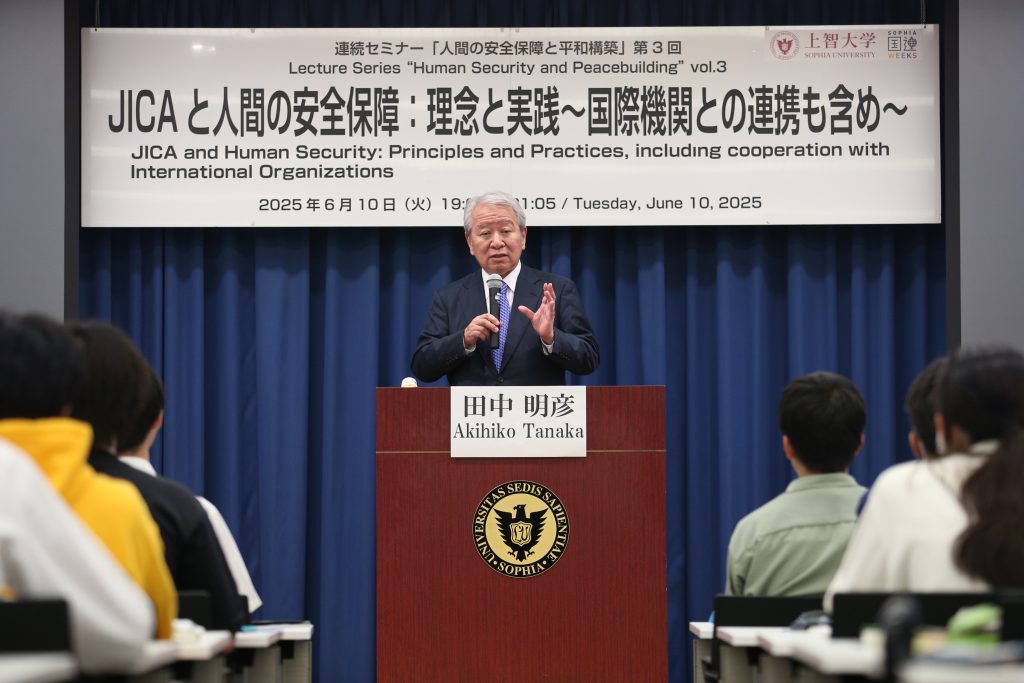

During the second half of the panel discussion, enthusiastic inquiries were made by the audience, to which careful responses were given by Dr. Tanaka. In closing, he said, “People are driven by anticipation. If we envision peace, it will be created. It is crucial to persist in articulating a vision of a peaceful future.” The participants found his message, which was both powerful and impactful, to be deeply moving.
Global Human Mobility: Current Situation and Challenges”
A symposium discussing the current state and challenges of global migration was held on January 12 in conjunction with the International Organization for Migration (IOM). Approximately 270 people participated in the symposium, both in person and online. The symposium aimed to explore ways to coexist amid a pivotal moment when issues related to “human mobility,” including migration and refugees, are becoming politicized in many countries worldwide. At the same time, challenges related to population decline and labor shortages are becoming more serious for receiving countries.
At the beginning of the session, Iori Kato, the IOM’s Director for Asia and the Pacific, delivered a video message. He explained the IOM’s mission and role, as well as the global dynamics of human mobility. He expressed hope that the symposium would lead to future action and dialogue, adding, “It is important to understand the state of migration properly and consider how to build a society where everyone can migrate with dignity.”
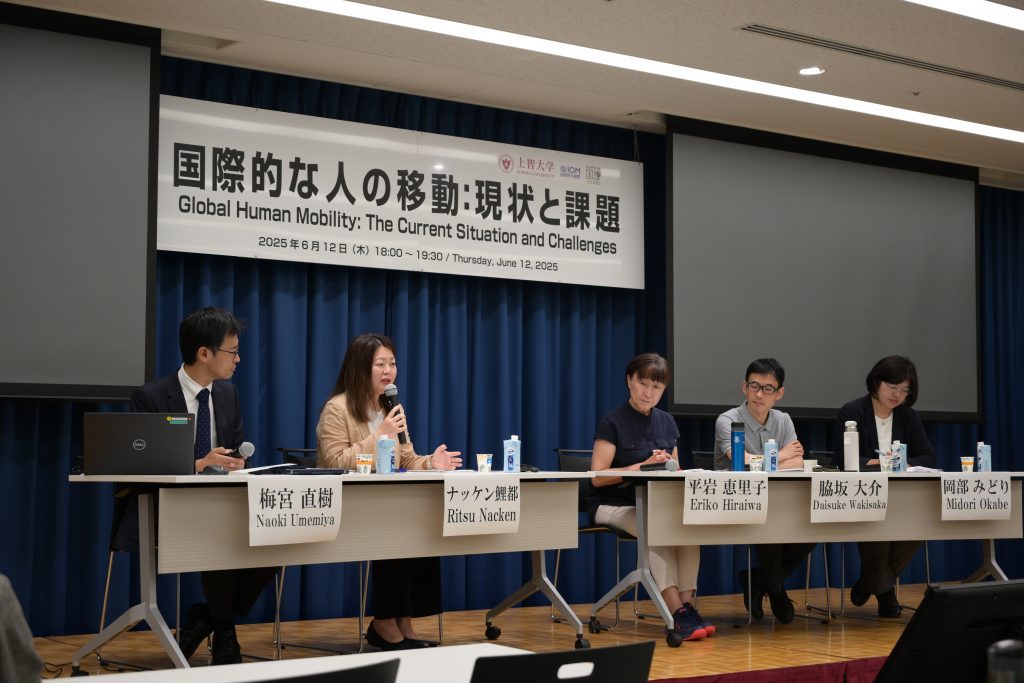
During the presentation, Ms. Eriko Hiraiwa, a former professor at Nanzan University’s School of International Liberal Studies, took the podium first from the standpoint of an economics expert. She explained the situation of international labor migration in Asia and its economic impact, emphasizing that Japan is already in the midst of a transnational migration trend and the challenge lies in embracing it.
Then, from a business perspective, Mr. Daisuke Wakisaka, Senior Executive Director of the Industrial Policy Division at Keidanren (Japan Business Federation), expressed a sense of crisis about Japan’s current situation amid global competition for human resources. He explained Keidanren’s foreign policy and discussed prospects for a society that welcomes foreign workers.
Next, Professor Midori Okabe of our university’s Faculty of Law, an expert in international relations, introduced immigration policies, focusing on examples from Europe and the United States. She stated that “no country has yet achieved success in accepting immigrants” and that the world is currently in the experimental stage of immigration policies.
Lastly, Mr. Nakken Koito, the UN IOM Representative in Japan, outlined strategies for addressing issues related to migrants in Japan. These strategies include evidence-based policymaking and raising public awareness of foreigners. He presented these strategies from the perspective of international migration governance and social integration.
During the second half of the panel discussion, various questions were raised, such as “What should Japan do to make human mobility sustainable?” “Should we allow the free movement of people as well as goods?” and “How can we balance the urgent need to support refugees with the need to support them?” Ms. Nakken wrapped up the symposium by offering a summary of the discussion, encouraging attendees to consider how to embrace immigrants as integral members of the community. She suggested that this could be achieved by being mindful of the available evidence and engaging in regular discussions about immigration and issues affecting foreigners while considering forming ties with foreign immigrants.
“International Organizations and International Cooperation Career Workshop”
On January 17, a career workshop was held for individuals seeking careers in international organizations and international cooperation fields. At the beginning of the workshop, the moderator, Professor Naoki Umemiya (Deputy Director of SHRIC), introduced the day’s speakers.
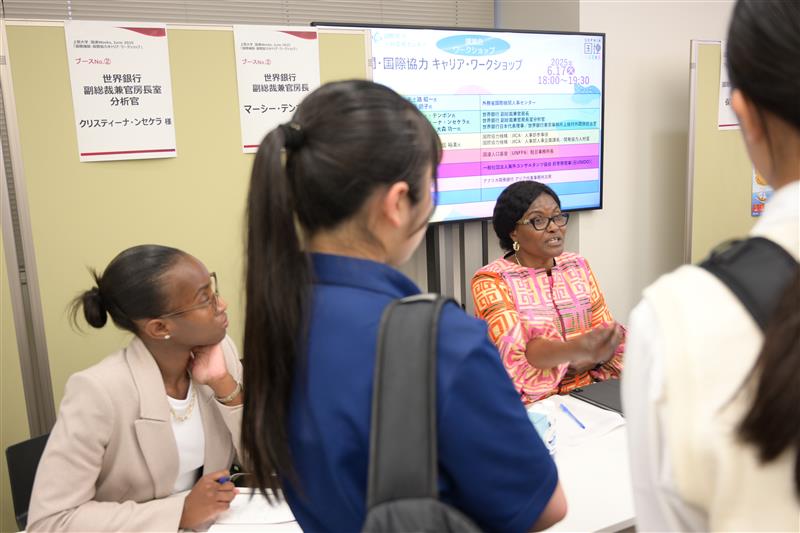
As the guest of honor, World Bank Vice President and Corporate Secretary Marcy Tembon addressed the audience, introducing the mission and role of the World Bank Group. The World Bank Group is an international organization with about 30,000 employees from 180 countries. Ms.Tembon said, “In a planet earth where humankind coexists sustainably, the World Bank Group aims to eradicate poverty. I look forward to sharing my career and experience with you today through Q&A and dialogue.”
A keynote speech was then delivered by Ms. Eiko Narita, Director of the United Nations Population Fund (UNFPA) Office in Japan. Ms. Narita, who has over 20 years of experience working for the United Nations Population Fund (UNFPA) in Bangladesh, Yemen, and other countries, listed three necessary skills for working for an international organization: 1) The capacity to outline a narrative in a clear and precise manner, 2) the ability to respond to inquiries with precision, and 3) a sense of poise and self-assurance in conducting oneself with integrity. She then shared her experience taking the JPO (Junior Professional Officer) exam three times before finally passing on her third attempt. Her story encouraged the students who participated in the seminar.
In the latter half of the workshop, the following guests were present: Ms. Tembong, Ms. Narita, Mr. Hisashi Takanashi (former Executive Director of the Overseas Consultants Association of Japan (ECFA)), Mr. Shoichi Midoro (Human Resources Center for International Organizations, Ministry of Foreign Affairs), and Mr. Sei Kondo, counselor in the Human Resources Department at the Japan International Cooperation Agency (JICA); Mr. Naoshige Kinoshita, deputy director of the Asian representative office of the African Development Bank; and SHRIC staff members. At the booths, students, including high school students, were keenly seeking career advice, and learning about the demand for various jobs.
Participant Comment:
■”It is my dream to work for an international organization in the future, so I was motivated to learn what I should do as a student and what makes working for an international organization worthwhile” (high school student).
■”It taught me a lot of really meaningful things for the future. For example, it showed me how important it is to go out and meet the people and get to know their culture. It also taught me how to approach global issues as a Japanese person, instead of just relying on theoretical theories to find solutions” (high school student).
Refugee Film Festival: “Viva Maestro!”
On the 20th, as part of the Refugee Film Festival project and with the support of the United Nations Association for the UNHCR, “Viva Maestro!” was screened. One hundred thirty-four people, including students, high school students, graduates, and members of the general public, attended the screening.
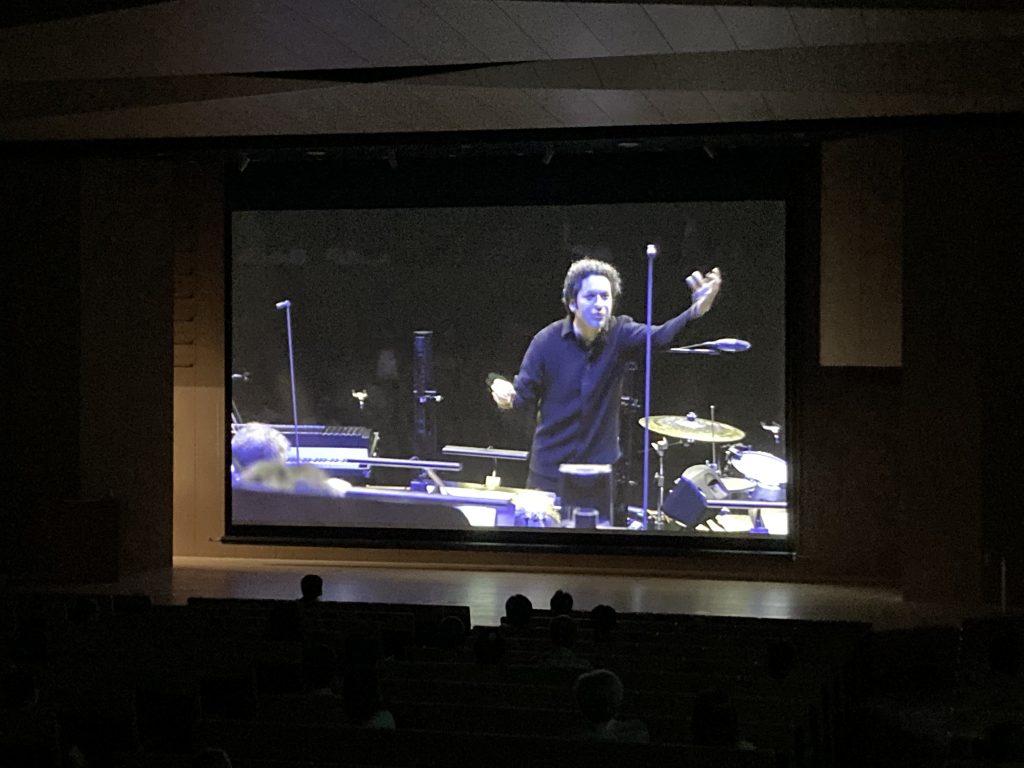
Professor Naoki Umemiya, Deputy Director of Human Resources Center for International Cooperation (SHRIC) and Director of the Center for Global Education, gave the opening remarks and served as moderator. A mini-lecture by Ms. Aki Sakaguchi, Institute of Developing Economies (IDE-JETRO) African and American Studies Group, Area Studies Center Research Fellow (Area Study on Venezuela), preceded the screening as the first part of the program.
Gustavo Dudamel, a world-class conductor from Venezuela, won the Gustav Mahler International Conducting Competition in 2004. Since then, he has conducted symphony orchestras around the world and is a superstar in the classical music world. He is also known for receiving the Venezuelan music education program “El Sistema” from childhood. “El Sistema” is a Venezuelan music education program that began in 1975. It has attracted worldwide attention for providing children, especially those in poverty, with free instruments and musical instruction under the government’s auspices, as well as for developing excellent social skills through musical experiences.
Venezuela is the world’s largest oil producer, yet it has fallen into economic collapse due to failed economic policies. Its GDP has shrunk by one-fifth in seven years, and it has one of the world’s worst safety records, with about one-fourth of its population fleeing the country. He explained that Venezuelan refugees account for 6.1 million of the world’s 43 million refugees.
The second part of the event was a film screening. The documentary closely follows Gustavo Dudamel as he searches for ways to continue making music with young people in his home country amid political and economic turmoil. The audience was enveloped by the beautiful music.
After the film, participants were given a questionnaire. One participant commented, “Today’s film strongly touched my heart, given the current situation of conflicts and disparity in many parts of the world, where people in vulnerable positions suffer from poverty and loss of life. I watched the film while asking myself what I, as an individual, can do to help.” “The brief commentary at the beginning allowed me to watch the film while thinking more deeply about it. I would like to recommend this wonderful film to my friends and acquaintances.”
“UN-IOM Rohingya Cultural Heritage Center World Tour”
The “UN-IOM Rohingya Cultural Heritage Center World Tour” exhibition was held from June 10 to 24 in the first-floor entrance hall of Building 2. The exhibition featured Rohingya embroideries created by members of the Rohingya community who have been forced to flee their homeland. The embroideries serve as a means to preserve their culture and traditions, as well as provide psychological care.
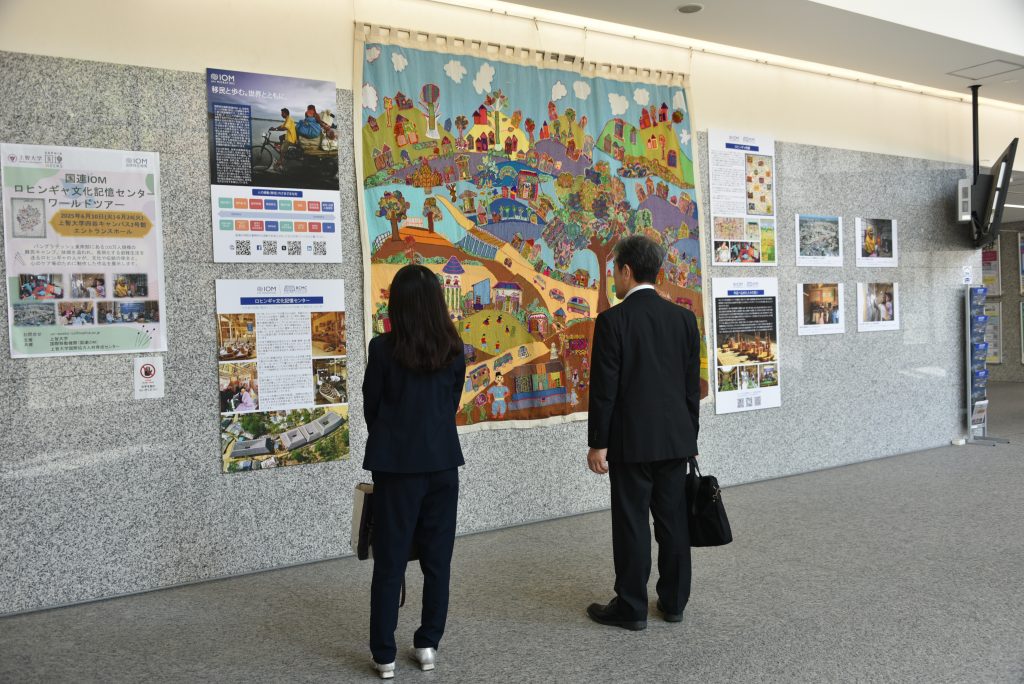
It is estimated that approximately 1 million Rohingya people fled persecution in Myanmar in 2017 and sought refuge in neighboring Bangladesh, where they continue to live in refugee camps. The UN-IOM operates 17 camps and supports approximately 500,000 people. Seventy-five percent of those forced to live in these conditions are women and children who continue to live under precarious conditions.
Against this backdrop, the UN IMO is working to restore hope through culture. The Rohingya Cultural Center provides camp residents with a place to maintain their identity and spiritual connection through cultural activities such as embroidery, painting, storytelling, and playing musical instruments.
Rohingya artists express memories of their homeland and way of life through their artwork. Through their art, the artists aim to pass on their culture to the next generation. The center also plays an important role in facilitating interaction with the local community and providing psychosocial care.
Eight years after the Rohingya crisis erupted, the Rohingya Cultural Memory Center continues its activities as a beacon of hope, helping displaced people envision a future without losing their culture amidst declining international interest and funding.